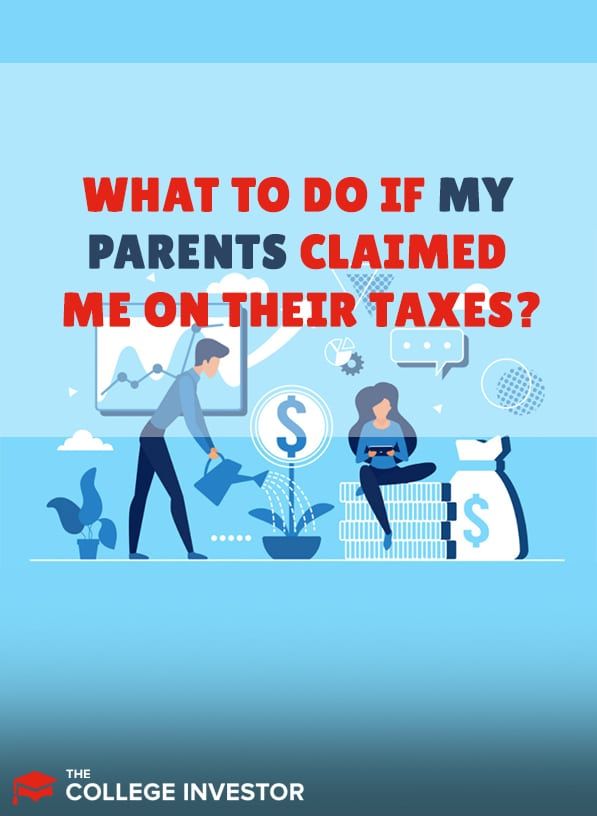
As you start working and making money, you are supporting yourself through your life and education. It's inevitable, and everyone goes through it. But it does look different for everyone.
You may be living with your parents, or your parents may be paying for college. Or your parents may be giving you money to help with your living expenses. Or perhaps your parents don’t give you any money at all. Read more about our thoughts about when you should and shouldn’t accept money your parents.
However, if you make money, you have to file your own 1040 income tax return. Then you get to the question that all online tax software asks: can I be claimed as a dependent on my parent’s tax return? And you think to yourself, I make my own money, they can’t claim me on their tax return! Your parents may have a different idea, and you both may end up getting a letter from the IRS as a result.
This little box on your tax return raises so many questions:
CAN your parents claim you as a dependent on their tax returns? Especially if you have a part-time or full-time job? What if you live away from home?
Let's break this down and see when they can claim you as a dependent and when they can't, and what you can do about it if having a discussion about money with your parents is a no-go.
First, you need to find out if you qualify to be claimed as a dependent.
Who Qualifies As A Dependent?
The IRS rules provide that there are really two types of dependents:
- a qualifying child
- a qualifying relative
Each type of dependent is subject to different rules, but the purpose of this article is to help you determine if you are a qualifying child. Your dependent status is especially important if you either earn your own money, or you are enrolled in school full time.
- Are you a citizen or resident?
You must be a U.S. citizen, a U.S. national, a U.S. resident, or a resident of Canada or Mexico.
- Is someone else already claiming you as a dependent?
Your parents can’t claim you as a dependent if you rightfully claim yourself (by taking your personal exemption), or if someone else claims you as a dependent (another parent if your parents are divorced, or another person).
- Are you filing a joint return?
You cannot claim someone who is married and files a joint tax return. If you are married, and you file a joint return with your spouse, your parents cannot claim you as a dependent.
Qualifying Child
In addition to the qualifications above, to claim an exemption for a dependent child, the parents must be able to answer "yes" to all of the following questions.
- Relationship Test
Any of these relationships, including biological parents, are considered as qualifying relatives for the purpose of claiming a child as a dependent. The child must be their son, daughter, stepchild, eligible foster child, brother, sister, half brother, half sister, stepbrother, stepsister, adopted child or an offspring of any of them.
- Age Test:
You must be under the age of 19 for your parents to claim you as a dependent. However, if you are a full-time student, you must be under age 24 in order for your parents to claim you as a dependent. If you are totally and permanently disabled, there is no age limit for your parents to claim you as a dependent.
- Do you live with your parents?
You must live with your parents for more than half the year, with some exceptions.
- Do your parents provide more than half of your financially?
Your job cannot provide more than half of your support.
- Are you being claimed as a dependent by someone other than your parents?
This is a common issue for children of divorced parents. Here you must use the “tie breaker rules,” which are found in Internal Revenue Service (IRS) Publication 501. These rules establish income, parentage and residency requirements for claiming a child.
Rules For College Students
If you are over the age of 19, and not a full time student, then your parents cannot claim you as a dependent.
There is no age limit for parents to claim their child if that child that is permanently and totally disabled.
If you are under the age of 24 and a full time student, your parents can claim you if you are enrolled as a full time student at an accredited institution, AND your parents provide more than 50% of your support.
Scholarships or grants received by the student do not count as the student providing their own support. If you did not provide 50% of your support, then you must select the option for "I can be claimed on someone else's return" even if your parents do not claim you. The IRS has a worksheet that will help you determine who provides more than 50% of the support.
Do your parents pay for your college? Do you think your parents should pay for your college? Click here to review the pros and cons of parents paying for college.
What If More Than One Person Is Supporting Me?
If your parents are divorced or separated, you will be a qualifying child of one of your parents. If you don’t meet the requirements of being a qualifying child for either parent, chances are, you can still be a qualifying relative.
In a nutshell, a child will be treated as being the qualifying relative of his or her noncustodial parent if all four of the following statements are true.
- Your parents are legally separated under a divorce decree or separate maintenance decree, or written separation agreement, or they lived apart at all times during the last 6 months of the year when they were not married.
- You received over half your support from your parents.
- You were in the custody of one or both parents for more than half the year.
- The custodial parent signs a written declaration promising not to claim the child for that year, and the noncustodial parent attaches the written declaration to his or her return.
There are special rules for divorce decrees categorized by the year of the divorce decree. For more information and specific terms, click here.
In the case of Multiple Support Agreements, two or more people combined provide for more than half a person’s support. When this happens, you can agree that any one of those people who provides more than 10% of the support can claim the child as a qualifying relative, and the person claiming the dependent must attach a multiple support declaration to their tax return.
Letting Your Parents Claim You As A Dependent Child on Their Tax Return
Once your parents claim you as a dependent on their tax return, your parents will also claim all scholarships, grants, tuition payments, and your 1098-T on their tax return.
In addition, your parents will also be able to claim all eligible educational tax credits.
What You Must Do If Your Parents Can Claim You As a Dependent:
If you earned income, but your parents still qualify to claim you as a dependent, all you have to do is select the option for “I can be claimed on someone else’s return”.
Tax Advantages for Parents Claiming You on Their Tax Return
Parents will qualify for educational credits that students potentially cannot get on their own. If your parents meet the requirements to claim you, let them! If your parents meet the requirements, but choose not to claim you, then you still have to select the option for “I can be claimed on someone else’s return” when you file your tax return.
Your parents may also be eligible for the child tax credit and the earned-income tax credit, which can result in a sizable refund or substantial tax savings.
What To Do if You Or Your Parents Made Tax Return Errors
It's sadly very common that adult children and parents don't talk - especially about money and taxes. So, what happens if your parents claimed you on their taxes and you filed for yourself? Here are the tax consequences you and your parents will face if either of you make a mistake.
First, you will both get a notice from the IRS and will need to respond with the proper documentation. If you claimed yourself, and your parents claimed you, one of you has to make the correction to the tax return. After that return is processed, the other party may file their return next.
If you file your tax return before your parents file their tax returns, their return will get rejected for the dependent exemption. If your parents file before you file your return, then your return may get rejected for claiming the self-exemption.
If either the parents or child can prove that the other party wrongfully claimed the exemption, the party proven wrong may be subject to an audit.
In 99.5% of situations, it's easier to have a simple conversation up front than have to deal with it via the IRS.
Final Thoughts
Remember, even if you want to claim the self-exemption on your tax return, you will want to go through the tests discussed above to ensure that you qualify to claim yourself, and you will also want to evaluate the tax advantages of your parents claiming you as a dependent.
The most important lesson here is that you and your parents should be on the same page, otherwise, you and your parents will have to answer to the IRS.

Robert Farrington is America’s Millennial Money Expert® and America’s Student Loan Debt Expert™, and the founder of The College Investor, a personal finance site dedicated to helping millennials escape student loan debt to start investing and building wealth for the future. You can learn more about him on the About Page or on his personal site RobertFarrington.com.
He regularly writes about investing, student loan debt, and general personal finance topics geared toward anyone wanting to earn more, get out of debt, and start building wealth for the future.
He has been quoted in major publications, including the New York Times, Wall Street Journal, Washington Post, ABC, NBC, Today, and more. He is also a regular contributor to Forbes.
Editor: Clint Proctor Reviewed by: Chris Muller
